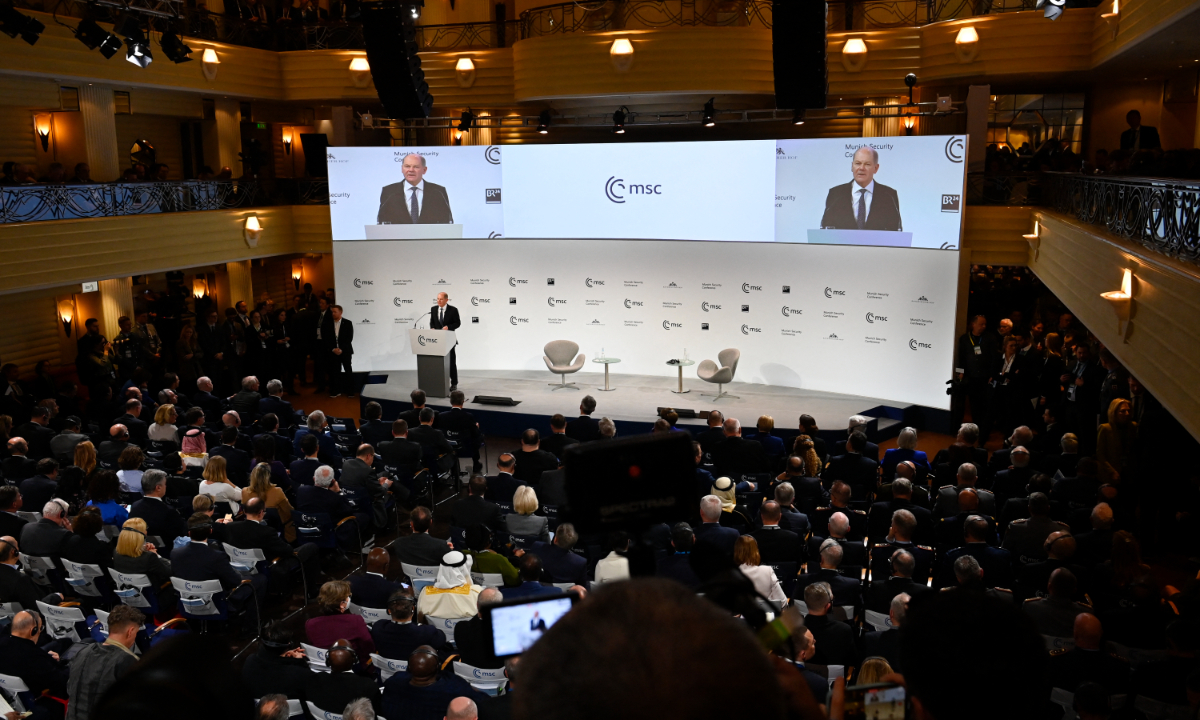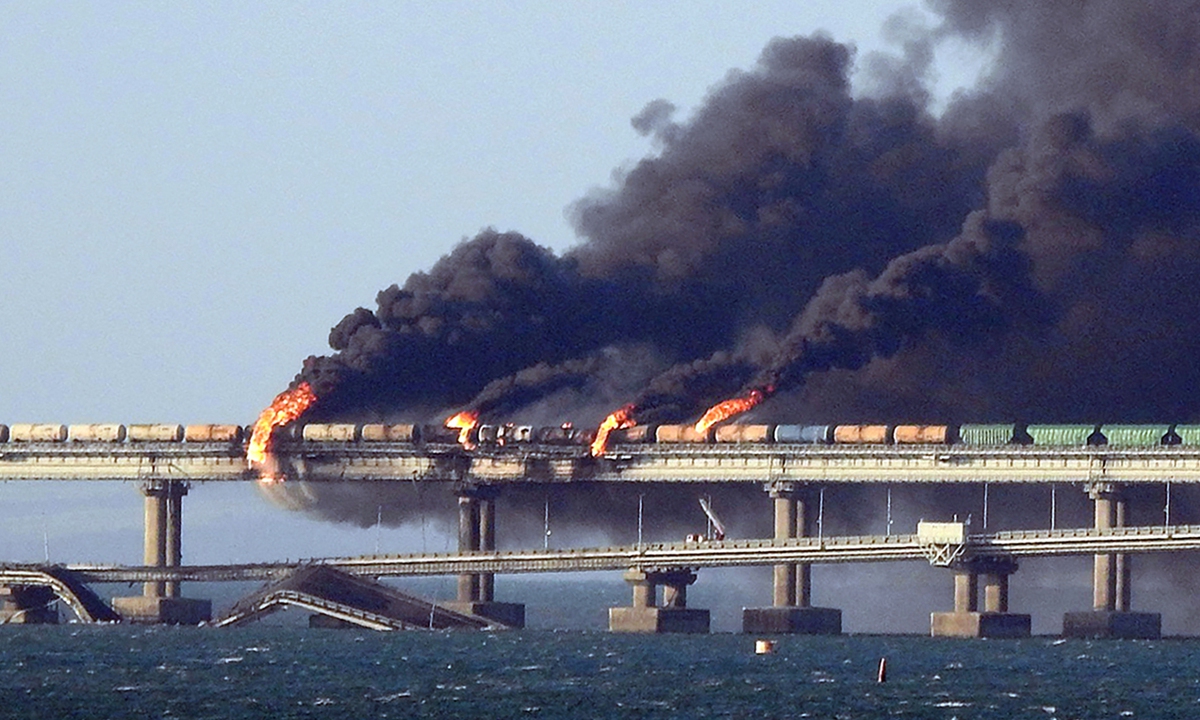
German Chancellor Olaf Scholz delivers a speech at the Munich Security Conference (MSC) in Munich, Germany, on February 17, 2023. Running from February 17 to 19, MSC 2023 brings world leaders together ahead of the first anniversary of the Russia-Ukraine conflict. Photo: AFP
The 2023 Munich Security Conference (MSC) kicked off on Friday in Germany, with the Russia-Ukraine conflict topping the agenda. With the first anniversary of the outbreak of the military conflict drawing near, Europe and the world are hoping for a better solution to end or at least ease the conflict, which has resulted in casualties, division and recession. Chinese top diplomat Wang Yi was scheduled to attend the 59th MSC held from Friday to Sunday, and is expected to deliver a speech at the China session to make clear China's abiding commitment to peaceful development and convey its vision on security.
Wang Yi, a member of the Political Bureau of the Communist Party of China (CPC) Central Committee and director of the Office of the Foreign Affairs Commission of the CPC Central Committee, is the highest-ranking Chinese official to visit Europe since the 20th CPC National Congress. He is also the first senior Chinese official to participate in the MSC in three years since the COVID-19 pandemic started, which observers believe shows the great significance that China attaches to the conference.
The MSC brings together about 40 heads of state and government, as well as hundreds of policymakers and security experts from about 100 countries. Organizers did not invite Iran and Russia, according to media reports.
US Vice President Kamala Harris and Secretary of State Antony Blinken are also scheduled to attend the three-day conference, with a possible meeting taking place between the latter and Wang Yi amid an ongoing spat over the "balloon incident."
NATO Secretary General, Jens Stoltenberg, will also attend the MSC and is expected to take part in bilateral engagements.
Analysts said that although Europe has been the biggest victim of the Russia-Ukraine conflict, given the dominant role of the US in transatlantic relations, they were not optimistic that the MSC could bring about a constructive solution. China, on the other hand, has always stuck to its role in promoting peace talks, and will take advantage of the multilateral stage to explain its concept of security and resolve misunderstandings.
Wang Yi's attendance may also help Europe better understand China's position on global security, military development and the Ukraine crisis, and build more mutual trust so as to better implement China's security propositions, they said.

Black smoke billows from a fire on the Crimean Bridge in the Kerch Strait connecting the Black Sea and the Sea of Azov on October 8, 2022. Photo: VCG
Unspeakable awkwardnessOn Friday's opening ceremony, German Chancellor Olaf Scholz and French President Emmanuel Macron both expressed the "sustained backing" for Ukraine after Ukraine President Volodymyr Zelensky called for more weapon delivery. However, analysts believed the worsening situation caused by military conflict has given Europe a sense of urgency to resolve the crisis, as Macron also addressed that it was absolutely necessary to already begin preparing the terms of peace for Ukraine.
Regarding the Russia-Ukraine conflict, the focus of the MSC, Wang Yi said that China had adopted an objective and impartial attitude and was always committed to promoting peace talks, during his meeting with French President Emmanuel Macron on Wednesday.
China stood ready to cooperate with the international community to promote a path to a political solution and reach a ceasefire at an early date, Wang Yi said.
Cui Hongjian, director of the Department of European Studies at the China Institute of International Studies, told the Global Times on Friday that China believes that conflicts cannot be fundamentally resolved through military means, and a ceasefire is necessary.
Russia and Ukraine should hold direct dialogue and communication without interference from outside factors. In addition, given the complex causes of the Ukraine crisis, talks must also be held between Russia and the US, and Russia and NATO, Cui said.
"Resolving only the conflict between Russia and Ukraine is not a fundamental solution… Even if the two sides manage to achieve a ceasefire, tensions could flare up again in the future," said Cui, taking the Minsk agreements in 2014 as an example.
After the outbreak of the Russia-Ukraine military conflict, Europe followed the US in imposing sanctions on Russia, and has suffered strikes, protests, and industrial and capital outflows. The deteriorating situation has made Europe feel a sense of urgency in solving the crisis, but for now, experts say it will be difficult for Europe to come up with a unified plan.
Li Haidong, a professor at the Institute of International Relations at the China Foreign Affairs University, told the Global Times on Friday that Europe's prosperity is based on peace, but Europe is suffering from an "unspeakable awkwardness" in solving the crisis.
Europe, the biggest victim of the Ukraine-Russia conflict, has become increasingly disappointed that the US dragged it into the state of conflict for Washington's own benefit, but they cannot openly express opposition, Li said, "How to prevent Europe from being taken hostage by the US is actually the real challenge to European security."
In the face of the increasingly complicated international situation, Macron told Wang Yi on Wednesday that France and China should work together to maintain stability and balance, uphold multilateralism, oppose bloc confrontations, and prevent the world from being broken apart.
"Europe's sense of strategic autonomy has been gradually re-awakened in the context of the damage caused by the Russia-Ukraine conflict," Li said, "Europe is not without politicians who would like to see a more multi-polar world, and such a blueprint is actually one that most countries would like to see, so dialogue between China and Europe is needed."
A Europe that is content to cling to the US cannot have its own independent voice. Europe's attempt to demonstrate its strategic autonomy is an important factor in attracting the world to engage with it, Li noted.
Transatlantic saboteurWith a focus on the transatlantic partnership, the MSC was created in 1963 during the Cold War as a united front against the Soviet Union. After the Cold War, it expanded its scope by inviting former enemies and discussing agendas beyond the military field.
However, the Financial Times said that the "MSC is going back to its roots," emphasizing that the majority of participants are from the West, and features the largest US congressional delegation in the MSC's history. Some are worried that it will become an "echo chamber" of the US and its allies.
The US ambition to dominate Europe is strong, as it is not willing to make any compromise on European security issues, which means that it will be difficult for the MSC to achieve an ideal result, namely a constructive solution to the Russia-Ukraine conflict and a rational view of the current international security situation, Li said.
"Washington wants to use Kiev to defeat Moscow. But defeating a nuclear power puts the world at enormous risk. The US is engaging in adventurism, but Europe will pay the price," he noted.
While prospects for the MSC are somewhat bleak due to its transatlantic saboteur, they would be even more disastrous without talks… That is why China and other peace-loving countries are willing to participate in an effort to resolve the crisis constructively, Li added.
The MSC provides a stage for countries to communicate on issues and to reach consensus to some extent, Li added.
At the same time, analysts do not rule out the possibility that the US will bind China and Russia together and link the Ukraine crisis with the situation across the Taiwan Straits during the conference and put pressure on China.
The MSC is actually an opportunity for China to refute and correct the US narrative, Cui Hongjian said.
China and Russia have different diplomatic cultures and political principles when looking at and dealing with changes in the international landscape and regional hotspot issues. Moreover, the Taiwan question is China's internal affair, which concerns China's sovereignty and territorial integrity. It is totally different in nature from the Ukraine crisis and cannot be compared, Cui said.
China's participation in the MSC will help Europe think about the complexity of the geopolitics, rather than simply dividing countries into black and white, and friends and foes, Cui said.





